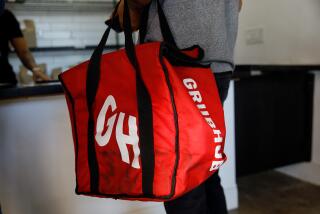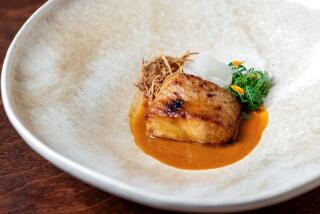Caviar launches food delivery service in L.A. amid food start-ups boom
A food delivery service named Caviar launched in Los Angeles on Wednesday, part of a crop of start-ups that are innovating the dining experience.
The San Francisco company has ventured into eight metropolitan areas with the L.A. entry, offering a courier service that will ferry meals from eateries for a flat fee of $9.99.
“Most good restaurants don’t deliver,” said Jason Wang, Caviar’s chief executive. “With us, it’s exclusive. You can’t get delivery any other way.”
Caviar is one of dozens of food start-ups that have sprung up in the last few years, eager to take advantage of customers with refined palates who are too busy to grab takeout or go grocery shopping. This year, GrubHub, the owner of delivery service Seamless, raised $192 million in its initial public offering.
Venture capital funding is pouring into the space. More than $1.6 billion was invested last year into food-related tech companies, up 33% from $1.2 billion in 2012, according to a report from consulting firm Rosenheim Advisors. 2014 is forecasted to be an even bigger year for food start-up funding.
Caviar has raised about $15 million in total, with its latest round in April raising $13 million.
Wang said Caviar stands out from the competition by partnering with higher quality restaurants that typically don’t deliver. In Los Angeles, the company has already inked deals with about 25 eateries, including Canter’s Deli, Border Grill and Hamasaku.
Customers place an order by typing in their ZIP Code on the Caviar website, which then pops up a list of the available restaurants in their delivery zone, along with photos of the food they can order from each location.
Food is guaranteed to arrive within an hour. Customers can keep track of couriers through a GPS tracking system. Typically, delivery is a $9.99 flat fee, but Los Angeles diners can get their food delivered for free for an indefinite time.
The company makes money from delivery and also by taking a cut from each restaurant order, Wang said. Depending on the eatery, Caviar can get as much as 25%.
In just two years with Caviar, Wang said he’s seen investor interest boom for food businesses.
“When we were just starting, no one cared about food delivery or food start-ups,” he said. “We were able to get profitable and grow based on very little money, and that showed VCs and investors.”
Follow Shan Li on Twitter @ShanLi







